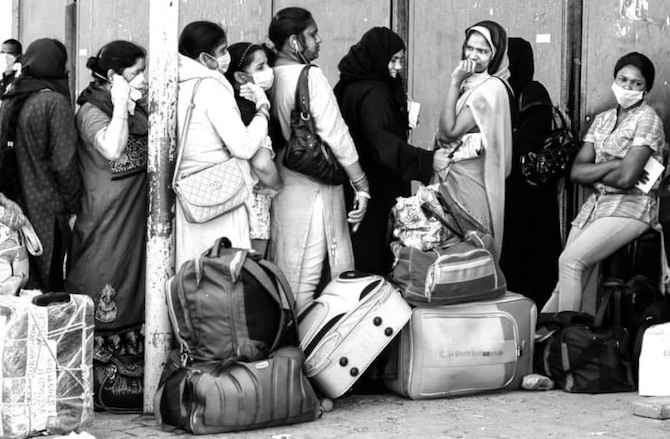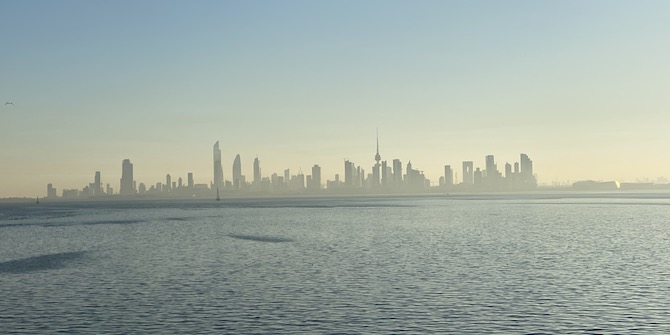by Shaikha Al-Hashem

The Covid-19 global pandemic has resulted not only in a global health crisis but also in a surfacing or resurfacing of deeply rooted and unaddressed issues. The GCC countries, despite their wealth, stand on shifting sands. The precarious nature of their oil and foreign labour-dependent economies is under threat with the latter perhaps more problematic and complex. Back in May, I co-authored an article on the outflow of foreign skilled labour when my initial concern was how this exodus might negatively impact the realisation of Kuwait Vision 2035. A short while after, similar articles began appearing in mainstream media across the GCC and internationally as though someone had pulled the plug and a surge of skilled and unskilled labour flowed out of the GCC sounding the alarm. Moving into June, the public discourse and direction shifted from health concerns to the health of the economy. Slowly, countries began lifting lockdowns and decreasing curfew hours; only Kuwait kept its labour districts under lockdown for an extended period. My attention then shifted to the real pressing issue: the situation of marginalised and low-skilled labour.
With the advent of the oil era and precisely following the turbulent almost decade-long Iran-Iraq war and subsequently the Gulf War, reliance and demand for low-skilled labour from south and south east Asia increased in the region. The process to import and deport them is simple and their wages are low due to their large number which renders them easily dispensable and replaceable by the receiving country. Furthermore, the Kafala (sponsorship) system allows the employer, organisation or individual absolute authority and control over the worker. Politically, migrant workers from Asian countries offered less of a headache in terms of governance as they were less likely to get involved in the political sphere as opposed to their Arab counterparts who had previously engaged in class politics and Arab Nationalism agendas which created civil unrest.
As Forstenlechner and Rutledge pointed out, ‘Asians were less likely to claim citizenship, could more easily remain disenfranchised and were seen as generally more likely to remain passive observers of political processes.’ According to Kristian Ulrichsen, the lack of linguistic, religious or cultural affinity from Asians posed little threat to the sovereignty and political order of the state. Economically, the mobilisation and circulation of migrant workers to the Gulf states benefited both the sending and receiving countries. The sending countries, especially poor ones, benefited from remittances from the high per capita incomes. The receiving countries benefited from the low wages.
Against this backdrop, I will attempt to read into the issue of the low-skilled and, specifically, marginalised workers by placing it within a framework inspired by Judith Butler’s most recent paper on the pandemic entitled ‘Losing Touch: Fragments on the Inhabitable World’ which she presented in a webinar series organised by The European Graduate School. My objective is not simply to narrate the tragic and inhumane situation of marginalised and low-skilled labour, but to present it as an ethics of liveability. Our relationship towards the marginalised is, in fact, one of extreme dependency. We depend on them as they depend on us and yet we choose to remain detached from their suffering and their basic right to be recognised as a human being.
Butler’s thesis states that ‘the inhabitability of the world is a precondition for a liveable life.’ For a life to be liveable, things like access to proper healthcare and treatment, standing against any forms of physical or institutional violence must be met. To ask, therefore, what constitutes a liveable life or what makes life liveable is to acknowledge that we are all aware that under certain ‘social or economic conditions life is not liveable’. On April 6, Kuwait imposed a lockdown on two major labour districts: Jleeb Al-Shayoukh (Jleeb) and Mahboula, and then later extended this to Al-Farwaniya, barricading the areas with barbed wire. Inhabitants of those districts, however, were left to move around freely with barely any social distancing instructions and any controls to minimise viral transmission by the authorities. There were no efforts to improve the unliveable conditions either. It was widely believed that everyone else was safe if these areas were closed off.
Only no one is really safe from a viral pandemic and the statistics began to prove it. Food and water were in short supply, access to proper hygiene and healthcare were not within reach and never were to begin with. Soon, local news began reporting suicide cases among the inhabitants of the lockdown districts. The news was met with apathy among nationals. This group of migrant workers is faceless and so our attitude towards them is senselessness. In Precarious Life, Butler approaches the question of how a human life is easily reduced to annulment, to the point of dehumanisation. She asked, ‘What counts as a liveable life and a grievable death?’ In the case of the inhabitants of Mahboula, Jleeb and Al-Farwaniya, the answer is flat out nothing. The conditions under which they live or exist are not liveable and their death and loss are not grieved widely.
What permitted the lives of low-skilled and marginalised workers to become ungrievable? Who are they really and why are they in such a dire situation? To answer these questions, one must understand the underlying feature of the Kafala system which is visa trading. In a nutshell, the Kafala system allows any foreign worker to enter the country through a national sponsor. The sponsor or employer has full legal and economic rights over the worker and therefore the worker is at the mercy of the sponsor. Job categories obviously vary but in the context of low-skilled and marginalised workers, their rights are nullified. This means they can be sold off or traded to another sponsor and end up doing a job they didn’t come to do. While visa trading operates in a black market, it is different from illegal immigration.
Omar Al-Ubaydli explained this distinction by showing that the main difference lies in their characteristics where the paperwork of the migrant entering a host country through a visa trader is completely valid and legal, however, they enter the black market when they are unofficially sold to another sponsor, whereas an illegal migrant is simply smuggled in. According to Al-Ubaydli, ‘hiring visa traded workers via the black market is attractive to sponsors because they can bypass recruitment fees and deny workers full rights such as housing, medical care and travel expenses. Unlike formal work contracts, the relationship can be instantly dissolved too.’ And so is the case with the majority of the inhabitants of Jleeb, Mahoubla and Al-Farwaniya.
It would be incorrect, however, to simply associate the issue solely with Kuwait or the other GCC countries. Visa traders operate beyond the borders of the state and have underground networks spread across the world and mediators who benefit from this form of human trafficking. Ultimately, it is the worker who is escaping poverty who ends up paying the price. Many migrant workers who move to the Gulf countries are already cuffed by migration debt contracts and so are willing to accept living in unliveable conditions to pay off debts and then slowly save up their wages to send back home to their poor families. Many accept the harsh living conditions in favour of the harsher conditions back home.
Butler ended her lecture with lamenting questions confined within the spectre of radical inequality, ‘Who wants to live in our world who would dispense with one’s life, a world in which one’s life is regarded as dispensable?’ With the lockdown lifted, the inhabitants of Mahboula, Jleeb and Al-Farwaniya scurry back to any job available under any condition to go on living their unliveable lives. While the government recently announced draft amendments to the Residency Law No. 17/1959 with more strict penalties on visa traders, there was no mention of any initiative to address the dire unliveable conditions of those districts. Once again, a sort of public amnesia befalls us as all the inhumane images we saw only a couple of months ago dissolve into the ether.





1 Comments